Football's Favourite Clichés: A Data-Driven Investigation
Unpacking the most used clichés, who is responsible for using them, and whether platitudes equal points on the board.
The language of football
For most kids that grow up playing football in the UK, it isn’t about learning to kick a ball—it’s about absorbing the great oral tradition of football clichés from the masters who came before them. Dads in jackets adorned with Partizan East Kilbride Under-11s branding—right breasts proudly stamped with their own initials—stand barking out tactical wisdom like “Still nil-nil!” after a fourth goal sails in, or “Put a name on it!” moments before their own kid ducks out of a header. These phrases aren’t really instructions—they’re heirlooms, carefully passed down so that one day, their child can repeat them in the pub as effortlessly as their predecessors.
Presumably fuelled by similar experiences, brave pioneers such as Bryan’s Gunn and Adam Hurrey have taken up the noble calling of documenting football’s clichés. Bryan’s Gunn, a man on what he describes as “a one-man mission to break football down into its constituent parts,” has produced fine art: compilations of football managers, players and pundits confidently uttering football’s favourite clichés—cut together with clips of Dion Dublin’s Homes Under the Hammer. If Bryan’s Gunn is Banksy, Adam Hurrey is Aristotle. Through his books, the long-running Football Cliches podcast alongside Charlie Eccleshare and David Walker and his articles for The Athletic, Hurrey has spent over a decade cataloguing football’s linguistic furniture.
I am neither artist, philosopher, nor a particularly competent writer. What I am, however, is an emotionless analytical droid. It’s in that spirit of cold, clinical curiosity that I offer what can only be described as a monumental breakthrough in football analysis: a quantitative study of cliché usage in Premier League press conferences. In this article I’ll identify the most overused phrases, expose which clubs are the worst offenders, and delve into whether using clichés translates to improved performances on the pitch.
Gathering the data
If there is one thing football isn’t short of, it’s media coverage. In the age of relentless monetisation and global reach, Premier League managers are wheeled out on a near-weekly basis to deliver their well-drilled soundbites to the press. Given these are football press conferences, featuring football managers, talking about football clubs, it stands to reason that they must be riddled with football clichés.

To test this, I used the YouTube transcript API to compile a dataset of press conference transcripts from Premier League clubs across the 2024/25 season. The chart above ranks clubs by their total available word count, where you’ll notice a few notable absentees: Aston Villa, Brentford, Ipswich and Tottenham. I can only hope those not already doomed to relegation will sort themselves out before next season, for the good of the dataset.
Identifying clichés
After putting together a dictionary of some of football’s favourite cliches, I used approximate string matching (commonly known as fuzzy matching) to automate the process of scanning the transcripts for clichés. I won’t bore you with all of the details here, but fuzzy matching is useful because it captures phrases even when there's slight variation. For instance, when Eddie Howe states Lloyd Kelly has "gotta come in and earn the right to play," fuzzy matching ensures we successfully recognise this as a match for the cliché "earned the right to play," despite minor wording differences. Anyone who knows anything about natural language processing will rightfully tell you there are more sophisticated ways of detecting phrases, but as a quick way of getting to a first approximation of cliché usage, this’ll do for now.
It is worth briefly mentioning here a couple of other limitations. These transcripts aren’t monologues—they include journalists' questions, club PR interjections, and the occasional player appearance. Therefore, not every cliché comes from the manager, and so the deeper analysis of individual managerial output later on should be taken with a pinch of salt. And while YouTube’s auto-captioning has come a long way, it still occasionally translates “we go again” into something about wet goats and hens, particularly when delivered through a thick regional accent and a muffled mic. This means that unfortunately, some clichés will go undetected.
Anyway, using this method, we get the word cloud below, in which clichés are displayed with size and colour proportional to their number of mentions. The undisputed champion is, of course, the immortal “at the end of the day,” clocking in a slightly underwhelming 17 mentions all season. Completing the Champions League spots are “no easy games” (10), “one game at a time” (9), and “business end of the season” (6).
Who is winning?
This is football, you probably just want to know how your team’s getting on. To rank the volume of clichés used during each team’s press conferences, while accounting for variation in length and number of press conferences between teams, I’ve devised a ranking system based on clichés per 10,000 words. It’s the cliché equivalent of goals per 90. By this metric, the current leaders going into the “business end of the season” are Nottingham Forest. Throughout the season, Nuno Espírito Santo has overseen press conferences whilst maintaining a remarkable 2.02 clichés per 10,000 words, a rate that is over 0.75 greater than their nearest rivals (Leicester, with 1.26 clichés per 10,000 words).
So how have they done it?
The plot above tracks Nottingham Forest’s rise through the cliché ranks over the course of the season. Much of the heavy lifting was done early on, with Nuno wasting no time in August by declaring before a clash away to Southampton that “there are no easy games and Southampton, very good team.” Perhaps a generous assessment, given that we now know Southampton were relegated by early April.
After a dip in form, Forest returned with a vengeance in December. In a pre-match press conference before playing Manchester City away from home, Nuno dropped “big ask” three times in the space of 18 words. That single burst was enough to rocket Forest up the rankings and, aside from the occasional top-up, they’ve been in cruise control ever since.
So, have all the big-hitters reached the summit by rattling off the same handful of stock phrases, or are we seeing some linguistic depth? To investigate, here’s a heatmap showing cliché frequency (per 10,000 words) for the current top five clubs.
Three of them—Nottingham Forest, Fulham, and Bournemouth—have made it there while relying on an armoury of six clichés or less. Newcastle, by contrast, have shown astonishing range. Under Eddie Howe—and what I can only assume is Jason Tindall whispering prompts from out of shot—they’ve deployed a record 15 different clichés. Eleven of those haven’t been used by any of the other clubs in the top five.
New manager bounce?
We also only see one club among the top five who has changed their manager during the season: Leicester. The cliché “new manager bounce”—describing the supposed short-term uplift in performance that follows the appointment of a new manager—feels like it’s gone a bit out of fashion recently, perhaps due to growing doubts over whether it actually exists. I did, however, read an article from Hurrey about how managers do tend to come out swinging in the cliché department during their early press conferences. Has that been the case this season?
Well, we can immediately rule out Manchester United, who, as seen in the earlier table, have managed to go the entire season without uttering a single cliché. A bold strategy considering the performances on the pitch suggested a team crying out for someone to say “we go again” just once.
Above, though, we see Leicester’s cliché-per-10,000-word league position over the course of the season. Steve Cooper got off to a flyer, overseeing a 1.95 cliché rate by rattling off a flurry of “point to prove”, “one game at a time”, and “earned the right to play”— at times seeing Leicester sit atop the cliché standings. Unfortunately, they were 16th in the actual Premier League, so Cooper got the boot.
In came Ruud van Nistelrooy, a man with a distinguished Premier League playing career—more than enough time to absorb the unwritten script of what to say to the press. And yet, his 0.53 clichés per 10,000 words suggested either a minimalist philosophy or outright defiance. It's been just enough to keep Leicester clinging onto second place in the cliché table, but with Newcastle closing the gap, it may not be enough to sustain their position.
Wolves have suffered a similar fate. Gary O’Neil managed a solid 0.79 cliché rate before his sacking. His replacement, Vítor Pereira, came in and only delivered 0.28—with Wolves now in free fall.
The only vaguely successful British-to-European managerial transition appears to have taken place at Southampton. Forward-thinking, possession-obsessed Russell Martin was replaced by the more direct Ivan Jurić. At first glance, it looked like Jurić had made an immediate impact—boosting Southampton’s cliché rate above Martin’s steady 0.50 per 10,000 words. But upon manual review, a twist emerged: every single cliché uttered since Martin’s departure could actually be traced back to Simon Rusk, who stepped in (twice) as caretaker manager. An important reminder that short-lived interim spells offer up an opportunity to relatively unknown quantities to make an impact on the big stage.
Of course, the real new manager bounce has never been about left-field European appointments with philosophies. It’s about trundling in your Allardyces and your Pulises. Staples of the British Managers Lunch Club. This was the approach taken by both Everton and West Ham this season.
Everton started the season with Sean Dyche, who was surely a bookies’ favourite to be right up there. His stellar cliché rate of 0.82 guided Everton to fifth. With this disappointing start, the appointment of veteran David Moyes—known for his love of “keeping up with the Joneses”—was surely expected to muster more than a solitary “at the end of the day” in March.
The only convincing new manager bounce came courtesy of West Ham. Stuck down in 16th, they turned to Graham Potter—once the darling of football’s tactical hipsters, later a Chelsea experiment gone wrong. Since his arrival, West Ham have embarked on a modest linguistic resurgence, with their cliché rate climbing from a flatlining zero to a respectable 0.76. It might just be enough to haul them into mid-table safety if he can maintain it for the rest of the season.
Ultimately, the data here is limited, with only six clubs changing manager this season—and the results are far from conclusive. While the early signs point towards a meat-and-two-veg British manager being the optimal appointment, I’m afraid I’ll need to gather more data than this before drawing any meaningful conclusions.
Do clichés win games?
More importantly than everything else: is there any correlation between cliché usage in press conferences and actual performance? The scatter plot below compares clichés per 10,000 words to points per game. The plot is divided into four quadrants, constructed using the league-wide averages for both cliché frequency and points per game.
The results? Statistically, it’s a dead end. A linear regression model suggests that clichés explain roughly 0.003% of the variance in performance. Whether there is a more complex relationship at play remains to be seen.
Still, there are cases worth poking at. Liverpool sit serenely in the top-left quadrant—consistently excellent on the pitch, yet virtually cliché-free off it. Nottingham Forest, meanwhile, prove it’s possible to lead the cliché standings and still pick up points. And then there’s Leicester: alone in the “high cliché, low performance” quadrant.
Whether it’s statistical significance or sheer coincidence that only one club combined above-average cliché use with below-average performance is hard to say—the sample size here is too small. If there’s a takeaway of any actual value, it’s probably that clichés aren’t a tactical weapon. They’re a stylistic flourish, like wearing a suit on the touchline.
Hang on… that gives me an idea.






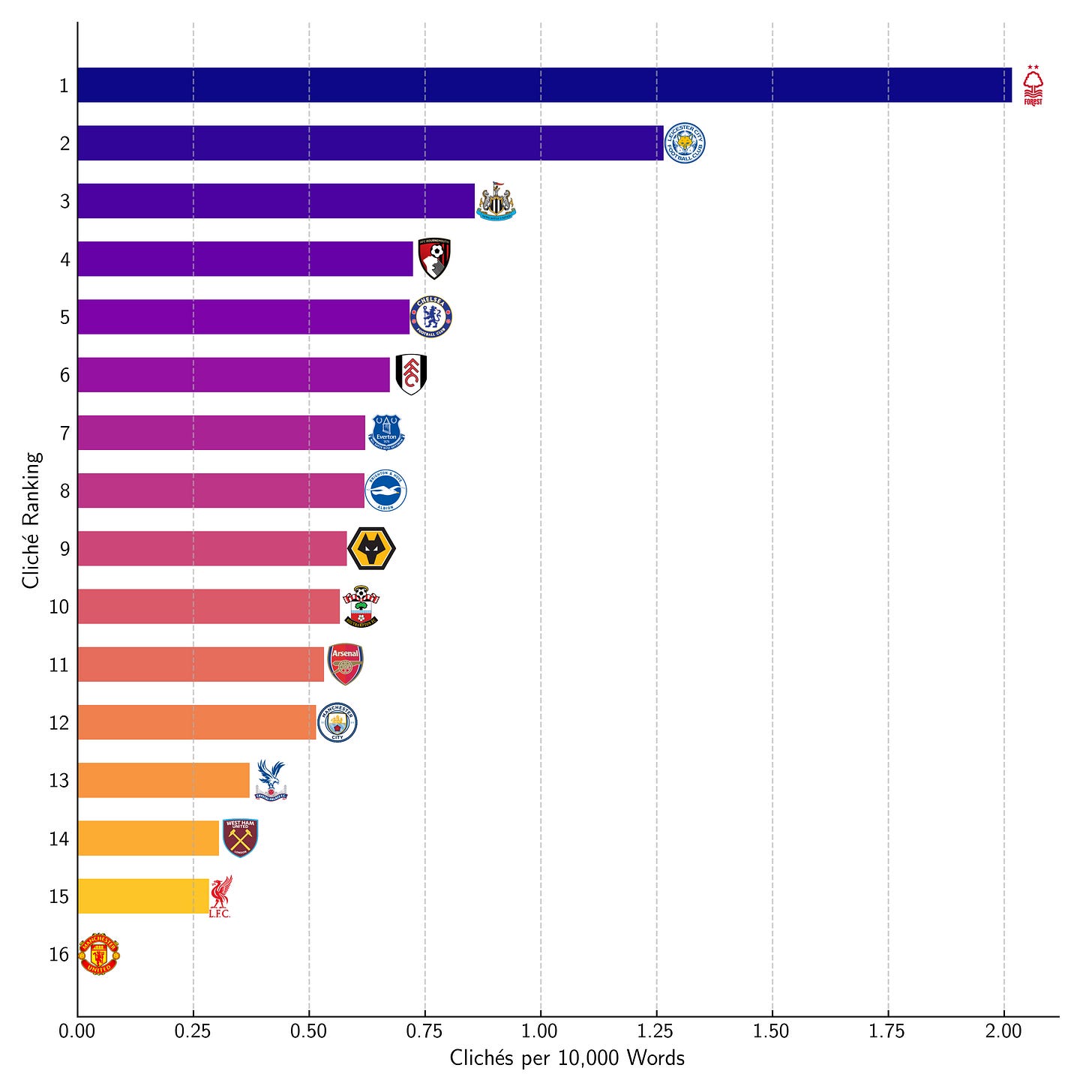
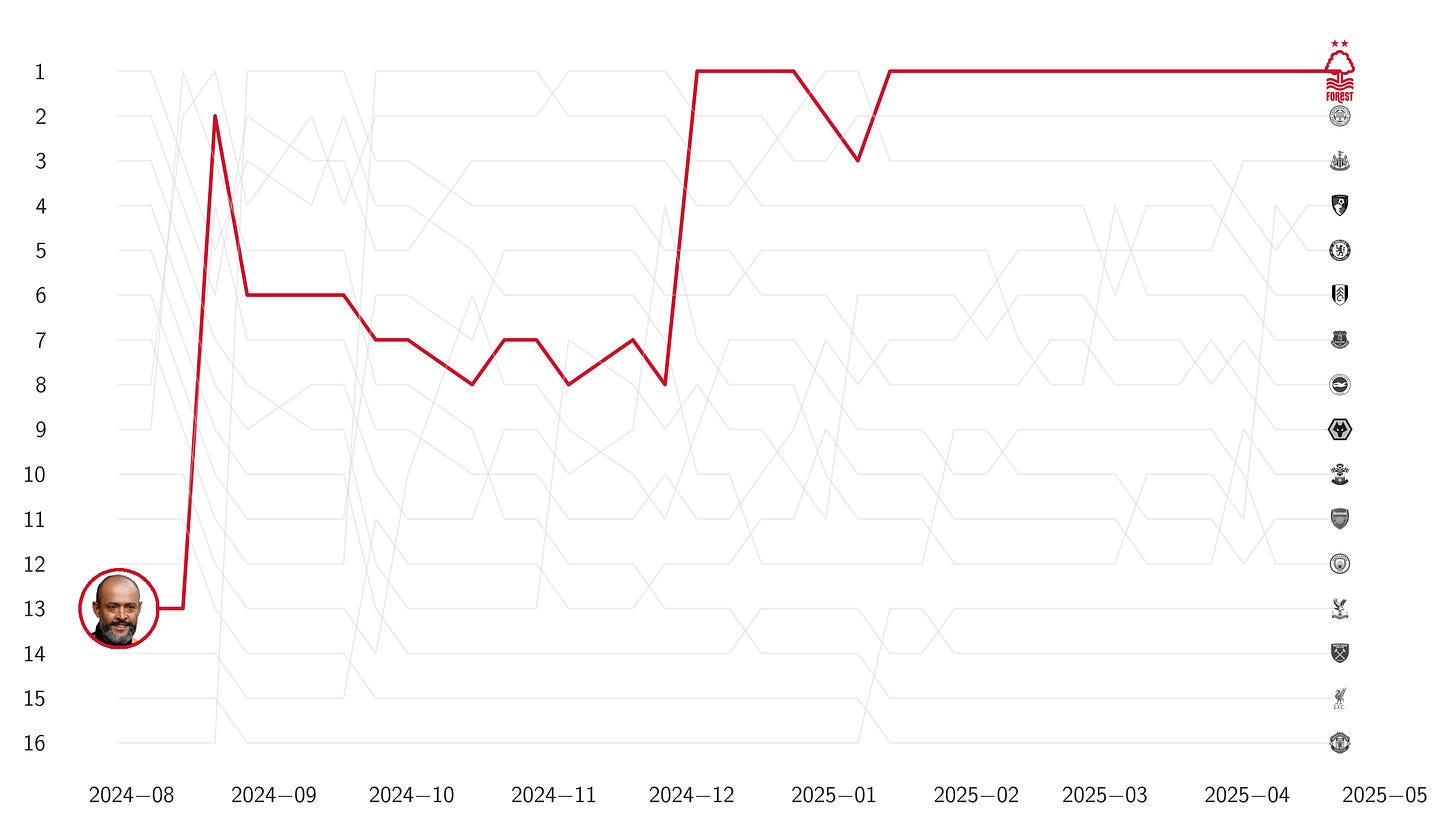

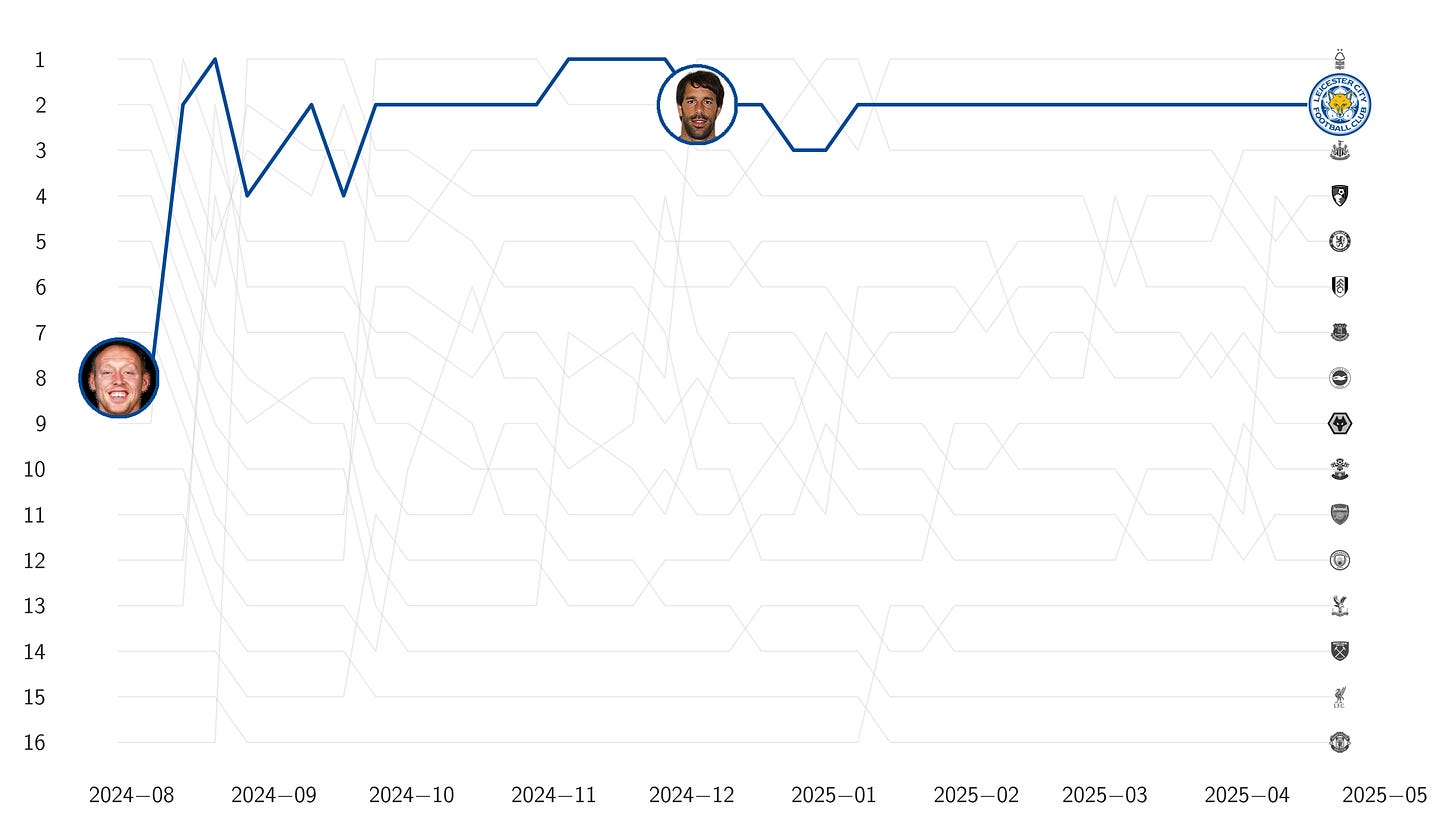
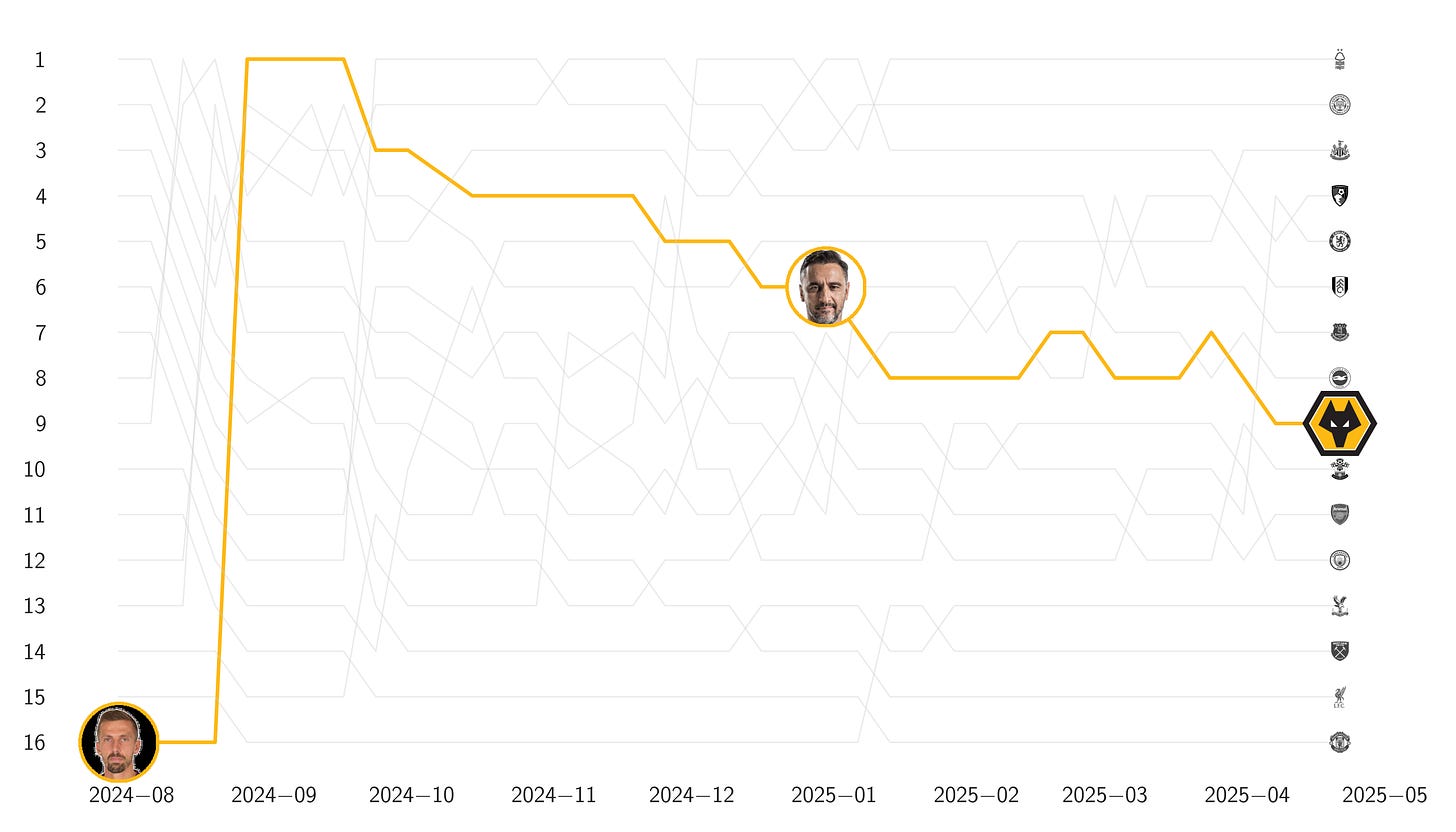
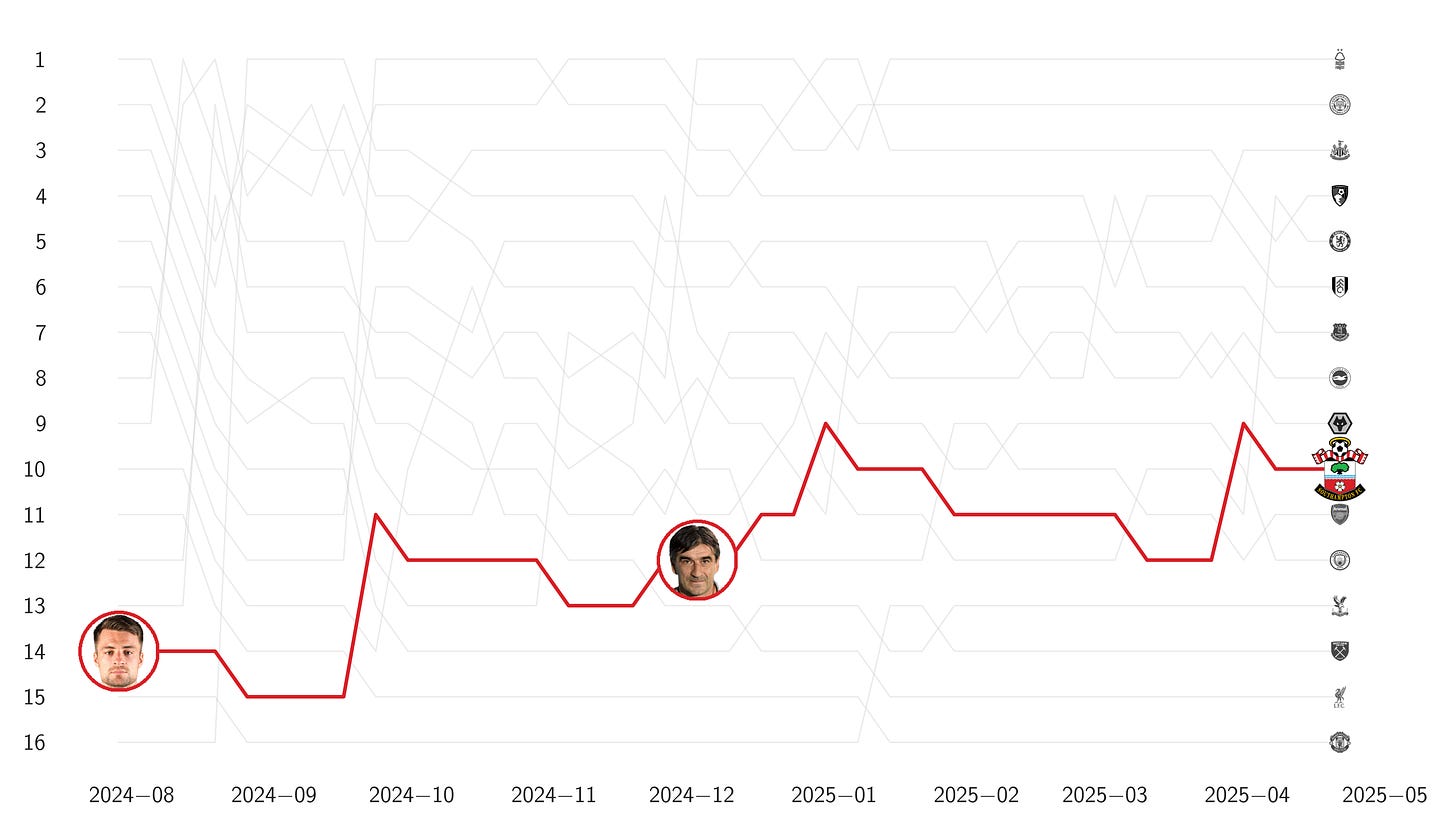
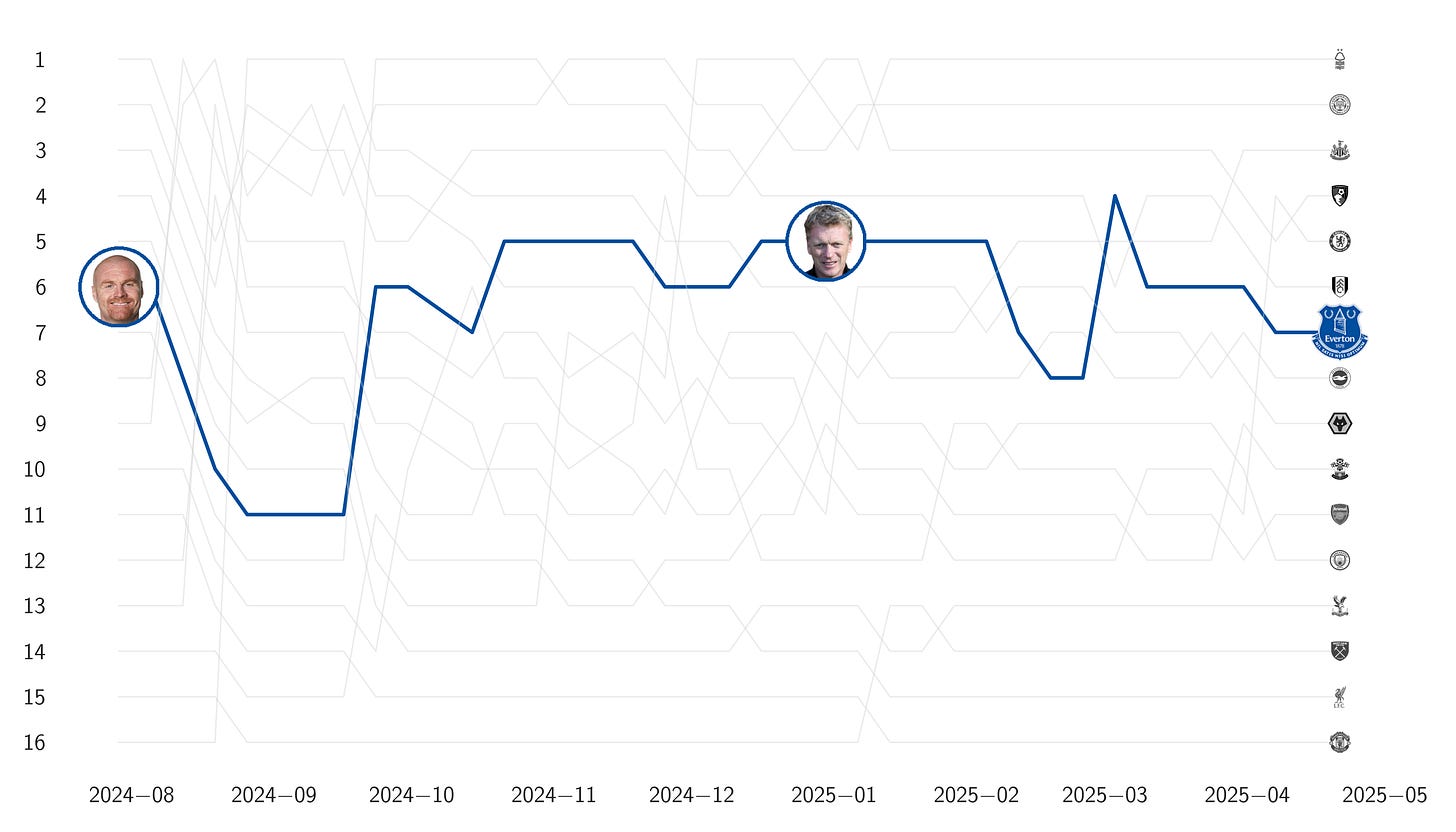
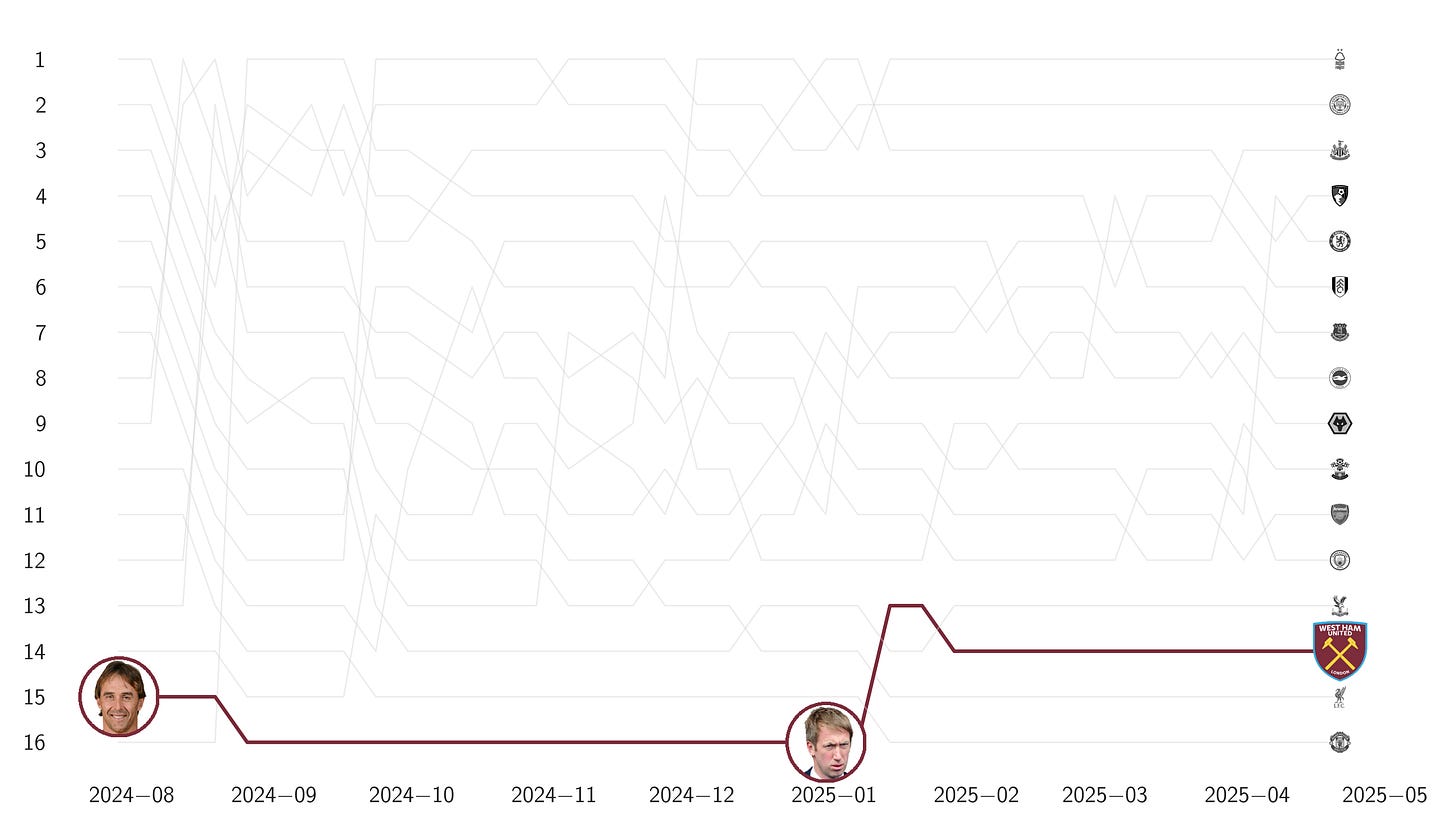
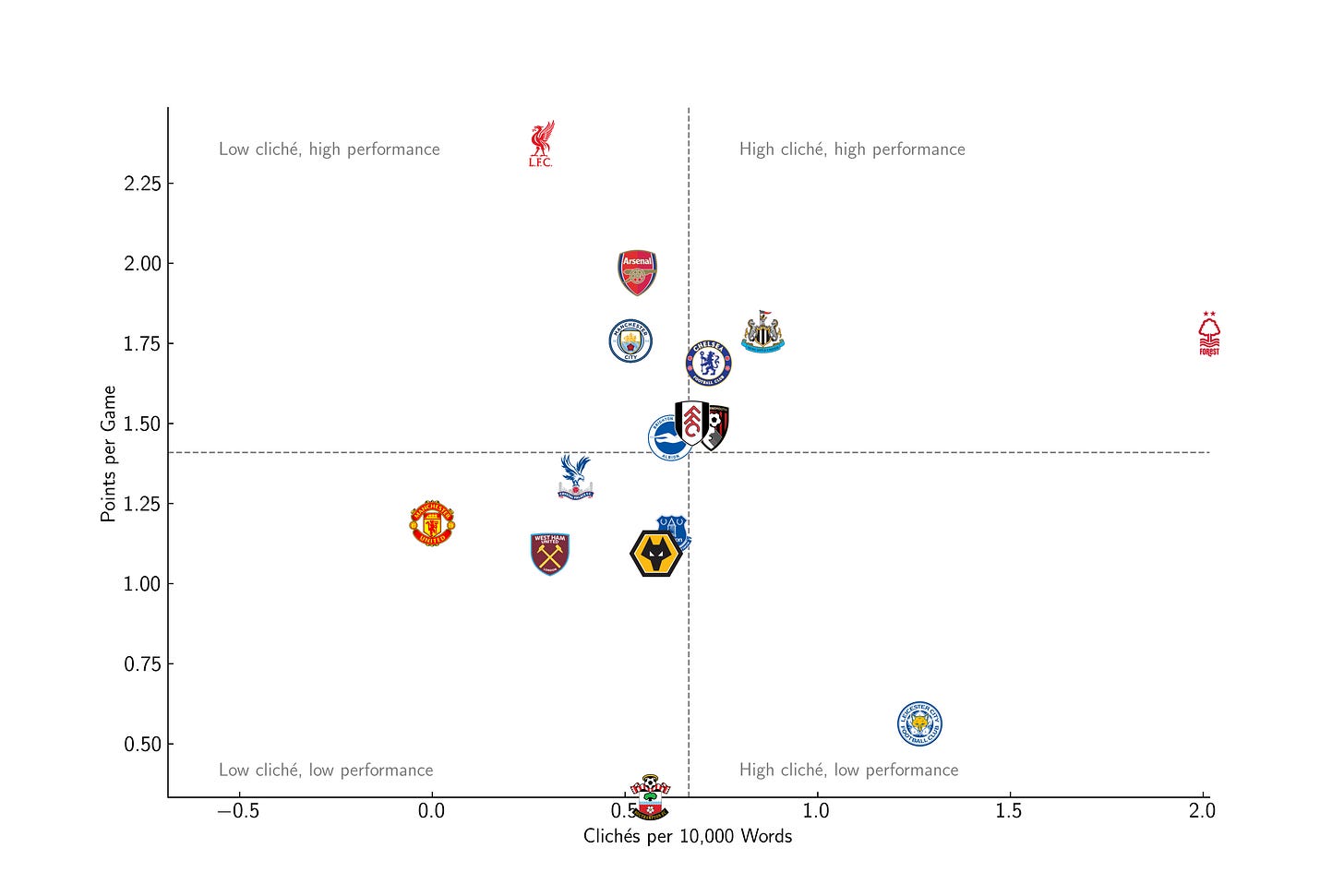
Innovative and a very interesting idea this.
This is absolutely superb